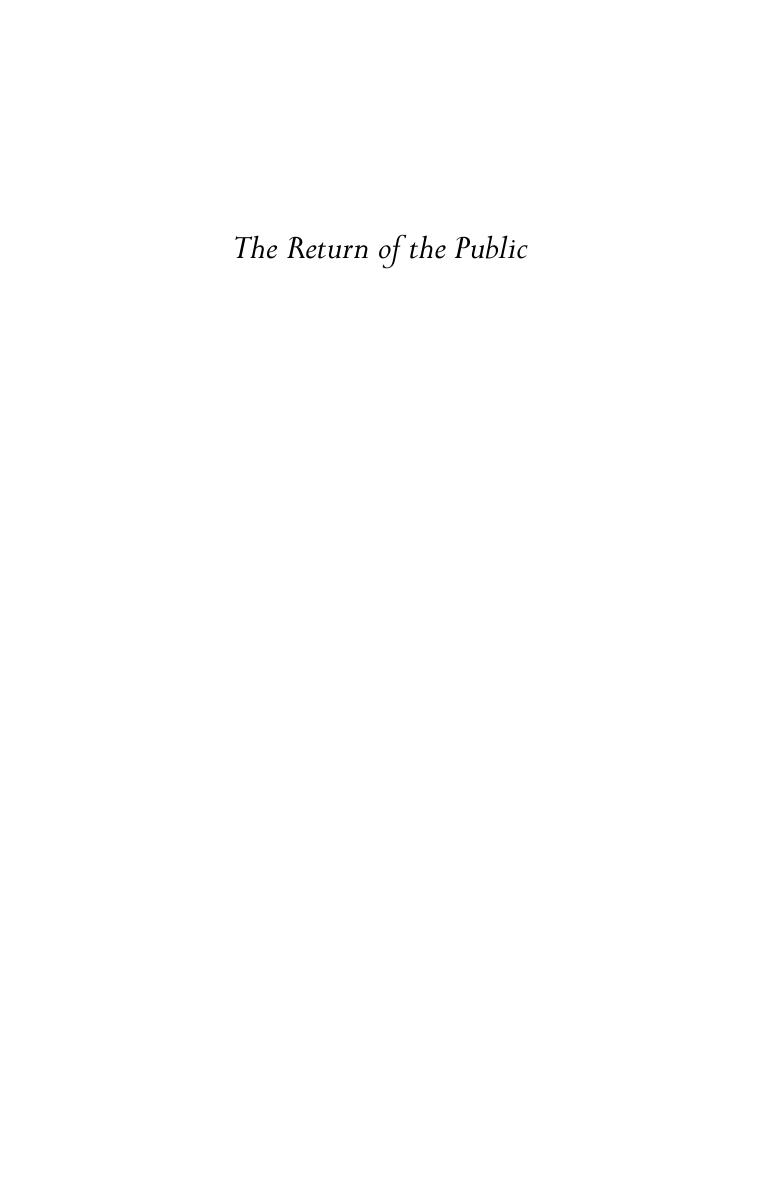The Return of the Public by Dan Hind

Author:Dan Hind
Language: eng
Format: epub, pdf
Publisher: Verso Books
Published: 2012-06-27T16:00:00+00:00
CHAPTER EIGHT
Estranged From Each Other
IN THE UNITED States consistent majorities favour policies that the two main parties and most experts and commentators either ignore or reject. In foreign policy this gap is especially pronounced. In The Foreign Policy Disconnect, Benjamin Page and Marshall Bouton explore popular preferences and American policy in considerable detail and conclude persuasively that ‘the actual foreign policies of the United States have often differed markedly from the policies that most Americans want’.1 For example, the authors show that the US population is much keener to strengthen the UN and much more likely to believe that the protection of jobs should be a very important foreign policy goal than are the policy-makers. As Page has written elsewhere, the evidence suggests that ‘the influence of the public was barely discernible’ on foreign policy. By contrast, he adds, business leaders and foreign policy experts have had a ‘big effect’ on decision-makers in government.2
In domestic politics strong support for state-funded healthcare has been recorded in opinion polls in the United States for more than 40 years. Yet when mainstream journalists notice this support, they can dismiss it with astonishing insouciance. As Noam Chomsky has noted, during the 2004 election the New York Times explained that Kerry had stressed that ‘his plan for expanding access to health insurance would not create a new government program’. The paper explained that this was because there was ‘so little political support for government intervention in the health care market in the United States’.3 Political support, according to the New York Times, was not something that the population could give on an issue as consequential as healthcare. The newspaper had the tact not to mention whose preferences translated into political support.
President Obama introduced a measure of healthcare reform in the spring of 2010. But while it expands healthcare coverage, the legislation leaves the private health-insurance industry substantially intact and falls far short of what most Americans say that they want. In January 2009 a New York Times/CBS poll found that 59 per cent of Americans wanted to see a ‘single-payer’ system introduced, in which the state guaranteed universal provision. Nine months later, after a furious propaganda campaign by the private healthcare lobby, 65 per cent of those polled by the New York Times still supported a ‘public option’, in which the state would offer healthcare insurance to all citizens in competition with existing private insurers.4 Much to the satisfaction of the major healthcare providers no such public option features in the bill that was passed.
At times, the ability of the media in America to ignore, dismiss or misunderstand the public’s preferences has achieved an astonishing, if presumably unconscious, virtuosity. In a study of the way opinion-poll results are interpreted, for example, Justin Lewis was struck by ‘the degree to which a whole range of apparently popular opinions can be ignored if they fall outside the general political framework advanced by political elites’. According to Lewis, public opinion that appears ‘centrist or conservative’ will be given
Download
This site does not store any files on its server. We only index and link to content provided by other sites. Please contact the content providers to delete copyright contents if any and email us, we'll remove relevant links or contents immediately.
The Secret History by Donna Tartt(19092)
The Social Justice Warrior Handbook by Lisa De Pasquale(12190)
Thirteen Reasons Why by Jay Asher(8912)
This Is How You Lose Her by Junot Diaz(6887)
Weapons of Math Destruction by Cathy O'Neil(6281)
Zero to One by Peter Thiel(5802)
Beartown by Fredrik Backman(5755)
The Myth of the Strong Leader by Archie Brown(5508)
The Fire Next Time by James Baldwin(5447)
How Democracies Die by Steven Levitsky & Daniel Ziblatt(5219)
Promise Me, Dad by Joe Biden(5154)
Stone's Rules by Roger Stone(5088)
A Higher Loyalty: Truth, Lies, and Leadership by James Comey(4964)
100 Deadly Skills by Clint Emerson(4926)
Rise and Kill First by Ronen Bergman(4789)
Secrecy World by Jake Bernstein(4753)
The David Icke Guide to the Global Conspiracy (and how to end it) by David Icke(4720)
The Farm by Tom Rob Smith(4514)
The Doomsday Machine by Daniel Ellsberg(4490)
